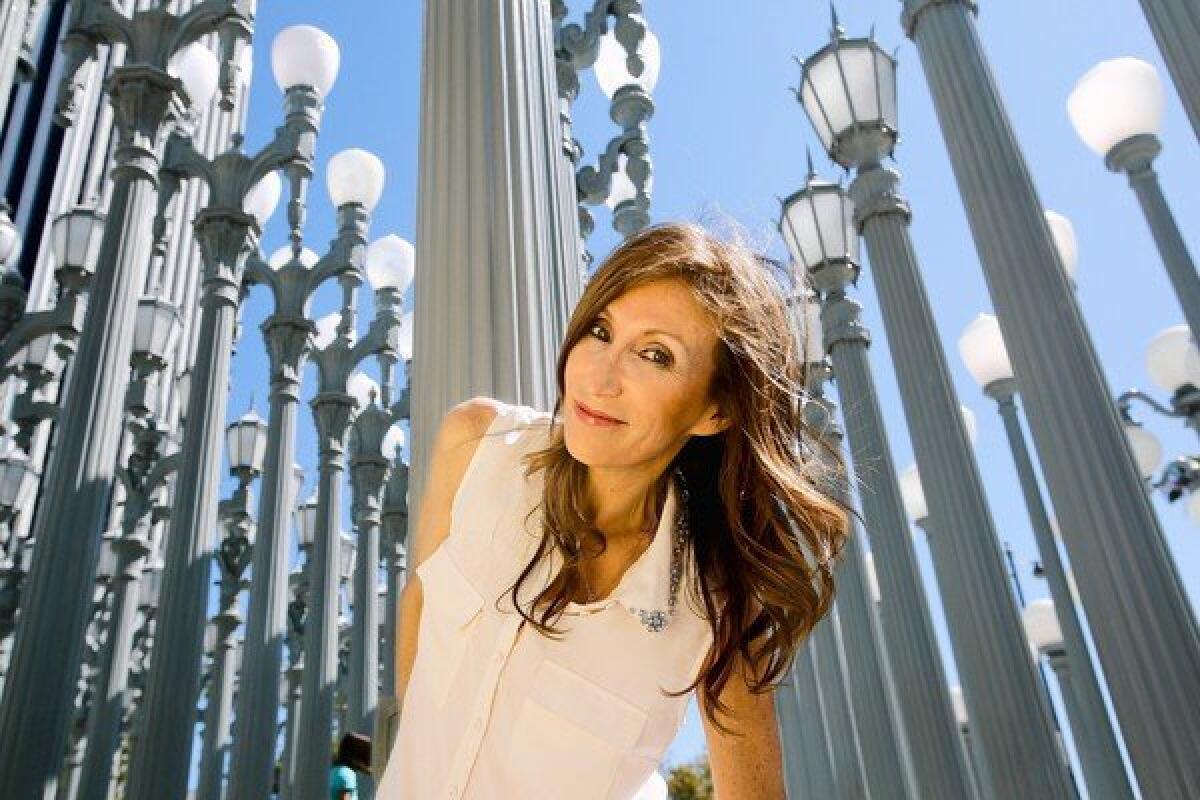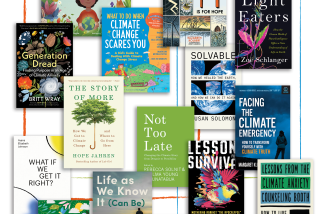Francesca Lia Block and her post-apocalyptic year

When Francesca Lia Block sat down to write her latest young adult novel, “Love in the Time of Global Warming” (Holt Books for Young Readers: 240 pp., $16.99), she took her beloved hometown of Los Angeles and destroyed it.
But she didn’t just destroy it. She burned it to the ground in the lyrical, hallucinogenic way in which she once elevated the very same city to celestial heights in her first novel, “Weetzie Bat,” and all the adult and young adult fiction she’s written since.
We meet 17-year old Penelope, the book’s protagonist, briefly during the catastrophic environmental event that she calls the “earth shaker,” and then in earnest two weeks later, adjusting to a new reality. “I forget that I am alone here in this house, with the sea roiling squid-ink purple-black, dark like a witch’s brew, just outside my window, where once there existed the rest of my city, now lost as far as I can see.”
The “earth shaker” is a quake that’s left L.A. — and who knows how much farther beyond — in ruins. Her parents and brother are presumed dead. Her dog is gone. Her home, a pink house in Venice that she hated leaving even for the hours of school and socializing, is halfway under water. She’s been living on her father’s hoarded supply of emergency provisions. When some menacing men enter the home, Penelope escapes in their van, and her journey for survival begins.
By now, we’re all familiar with the literary post-apocalyptic world’s metaphors. The zombies are our anxieties. The vampires are our greed. Our fairies are hope. Our werewolves are … what again? Something. But in writing “Global Warming,” the 50-year-old Block was doing something a little more personal than merely summing up our neuroses. She was trying to metabolize and indeed survive the state she found her own life in: chaos and uncertainty.
“Somebody asked me if it was cathartic to write about destroying Los Angeles,” says Block, sitting on a patio at the Los Angeles County Museum of Art, where some of the action in her book takes place. She has an angular face softened by brown hair that falls in waves around her rhinestone-collared shirt. “I said, no, it wasn’t cathartic at all. I love Los Angeles. That’s kind of what I’m known for in my writing. I was going through a lot of pain at that time in my life.”
In 2010, Block, who has two school-age children, found herself financially under water on her home in Culver City. At about the same time, her mother, who lived with Block and her kids and whose name was also on the title, was diagnosed with cancer. To make matters worse, Block says she was in danger of going blind. (One of her retinas spontaneously detached, while the other eye had developed a cataract.)
These were dark times for Block and her family, and so when she began writing the book she set it in a city that like her surroundings had been upended.
Block has been writing magical realist fiction for teens and adults since “Weetzie Bat” was published in 1989. That novel is about a teen girl who finds a genie in 1980s L.A. “Weetzie Bat” dealt with issues such as AIDS, premarital sex and homosexuality in a way that avoided the wholesome public service announcement style so often then seen in the genre — and it did so in what would become Block’s signature fantastical style, long before fantasy became de rigueur in YA literature.
She’s received the American Library Assn.’s Margaret A. Edwards Lifetime Achievement award and been the subject of book-banning discussions. But speaking with Block, it’s clear that she balks at terms such as “pioneer” and the restrictions of genre. She’s published poetry and erotic fiction and even a mythological dating guide called “Wood Nymph Seeks Centaur.” Her 2012 adult novel “The Elementals” follows a college student whose friend is missing. Another one, “Wasteland,” published in 2003, deals with incest and suicide. In total, she has published seven adult novels, 11 for young adults and three collections of poetry. She has more than 1 million books in print.
Block is dedicated to following her heart, despite the temptation to go slightly more commercial. It’s hard to pretend that “Love in the Time of Global Warming” doesn’t come at a time of blockbuster teen trilogies that are ready-made for the movies.
“I don’t know if I’ve resisted it because I’ve tried all kinds of different things,” says Block, whose next book is an adult novel about a serial killer. “I just really have been fortunate to write sort of whatever I am dreaming about at the time.”
Reality’s role
In “Global Warming,” although she borrows heavily and openly from Homer’s “The Odyssey,” much of her own recent struggle is on display too: There’s a journey from a state of peace to a state of precariousness and insecurity, a giant that has its eye poked out, a house no one can live in, a mother who is suddenly gone.
“This is something that I’ve done for years, even before I was really more plot-focused,” says Block. “I take my own life and collage it with a myth or fairy tale or something else that takes me out of my immediate little tiny world.”
But it also allowed her to deal with the issues at hand, doing the only thing she knew how to do: Write for a living and use her work to support her family. “It was a terrible year,” she says. “I was processing all of this chaos. That extended to the feeling of chaos around me, which was the destruction of the city in the book.”
There’s hope too in the book. Along the way, Penelope acquires new friends, Hex and Ezra, who become Pen’s de facto family. And though there are literal references to her terrible year — there is a building called Bank of the Apocalypse in the story — what is true of “Global Warming” is also true of Block’s other books: It’s an intense and focused exploration of a raw and human emotion.
After Penelope blinds a giant that attacks her, she is stricken: “Pain scorches when I move a certain way, and there is dried blood on my hands and on my thermal shirt. ‘We don’t need any more blood on our hands,’ the man had said. I would rather be dead than part of a world like this. I keep thinking I’m going to throw up again, and my hands won’t stop shaking no matter how hard I grip the steering wheel; it’s like I have a violent fever that’s trying to burn away the sickness of what I’ve seen and what I will become.”
Ultimately, the chaos relented for Block but not without drama and some tragedy.
She took to public radio and The Times to discuss her troubles with Bank of America. She began a blog called Save Francesca’s Faerie Cottage and filed a Change.org petition with more than 2,000 (mostly fan) signatures asking the bank to modify her loan. Finally, the bank agreed. Block had surgery on the eye with the detached retina, which saved the rest of the vision in that eye but left her with “a shadow where half of my vision was, and the rest is very blurry.” And sadly, her mother finally succumbed to her illness.
“My whole sense of self was kind of shattered, honestly,” says Block. “It was really profound.”
So as much as it may appear that she’s writing about magic and fantasy, Block insists that her work is pretty down-to-earth.
“I think that we’re all confronted with constant chaos in our daily lives that is not talked about,” says Block, her purple-painted fingernails playing with her necklace, a gold heart contained in a key. “It’s coming out in our fiction. But there is hope. It doesn’t all end in devastation.”
In the end, perhaps the goal of the modern post-apocalyptic world isn’t to stress us out more but to comfort us. “All those stories that are so scary,” says Block, “they also say that we have each other and we have love and we have family.” Even if it isn’t the family with whom we started our journey.
Brodesser-Akner is a writer who lives in Los Angeles.
More to Read
Sign up for our Book Club newsletter
Get the latest news, events and more from the Los Angeles Times Book Club, and help us get L.A. reading and talking.
You may occasionally receive promotional content from the Los Angeles Times.







